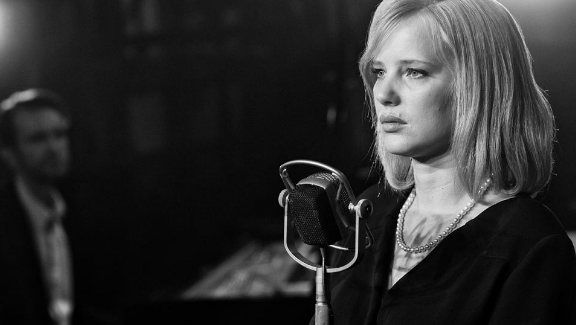Trying to put a thematic order to the disparity of films in Cannes often helps find a deeper purpose to their individual intentions. Here three of the worthier films among the lacklustre selection could be called Cold War I, II & III, in reference to that iron curtain that separated Europe after WW2 and, though officially over since the fall of the Berlin Wall, still prevails in a variety of geopolitical ways today.
Pawel Pawlikowski’s film is actually titled Zimna Wojna (Cold War) and opens in rural Poland in the late 40’s as two well-heeled intellectuals, Wiktor and Irena, set about recording Polish folk songs and auditioning performers for a new troupe that will both extol national identity and promote nascent communist party ideals. Among the locals, we immediately spot Zula as the third principal. The debonair Wiktor is captivated by her opportunistic adaptability while Irena sees only that her singing talents are short of the best. By now audiences are already delighted to see that Pawlikowski has returned to the pristine black and white, and austere 4/3 format, of his wonderful Ida (2013), which took the foreign language Oscar in 2014 and swept the board at the EFA Awards. The story of Cold War proceeds as Wiktor and Zula fall in love in ways that immediately seem different, her the rustic survivalist and him the romantic cosmopolitan poet. Her pragmatism means she remains behind as he defects to the West and exiles himself in 1950s Paris as, by a series of indecisions over maybe 20 years, their love affair veers from East to West and back and forth against a backdrop of arbitrary authoritarianism as their dysfunctioning passion becomes despairingly apparent. Despite its larger canvas, the story is less powerful and concentrated than Ida and is loosely based on Pawkilowski’s own parents’ relationship. At the halfway stage in Cannes it was the critics’ favourite.
Kirill Serebrennikov’s Leto (Summer), also in competition takes us on quite a different musical journey, to Brezhnev era Leningrad in the 1980s following the period leading up to Glasnost, Perestroika and the end of the Cold War. Almost a generation after Flower power exploded in the West, we discover the sweet and similar innocence among young Soviet hippies, extolling the intellectual subtexts of Bowie and Mott the Hoople. An understated and innocent romantic trio emerges à la Jules & Jim, as Mike the impresario pop musician and his wife Natashe, in different ways, take to the musical talents and Eastern charms of Viktor. Based on real characters, their music has its Western influenced charm that often seems naïve as it lays claim simultaneously to punk, new romantic and is really MOR pop rock. Given Serebrennikov’s current difficulties —he’s under house arrest in Russia after occupying high-flying roles in national Arts policy— one would have expected something grittier to capture some of the 80’s hard core dissidence as a way to echo the political harshness of Putin’s Russia today.
https://www.youtube.com/watch?v=KlHwIRZLFdc
For that, we have only to take a trip to present-day Donbass, through Sergei Loznitsa’s film of the same name, which opened the Un Certain Regard section. Loznitsa is no stranger to grit and grimness, though here he permits himself a loud sardonic laugh to swallow the sour taste of how human foibles putrefy the destinies of peoples. Donbass is the area in South-Eastern Ukraine we may have noted as we zap on the news channels to turmoil more comprehensible, like say Yemen or Syria. It is an area of fluid borders and incipiently staunch nationalism fabricated by the most primitive of propaganda in the struggle between Ukrainian forces and a Russian-backed separatist militia. In Donbass, the film, we look into the eyes, lies and lives of the populations caught up in the tit-for-tat mayhem. Loznitsa provides us with 13 sequences, ranging from a make-up truck for extras in this same movie, to the collective mugging of a ‘fascist’ prisoner tied to a lamp post, a sequence which follows onto a Fellini-esque wedding ceremony presided over by an official in this freshly formed geopolitical reality called Novorossiya. Loznitsa’s cold eye casts convincing sets of characters that exemplify and explain in an anarchistic way, why, when Putin lifts his little finger smarting from some perceived humiliation by the West, all human decency is forfeited, suggesting a hankering for the predictable order of the old style Cold War.

